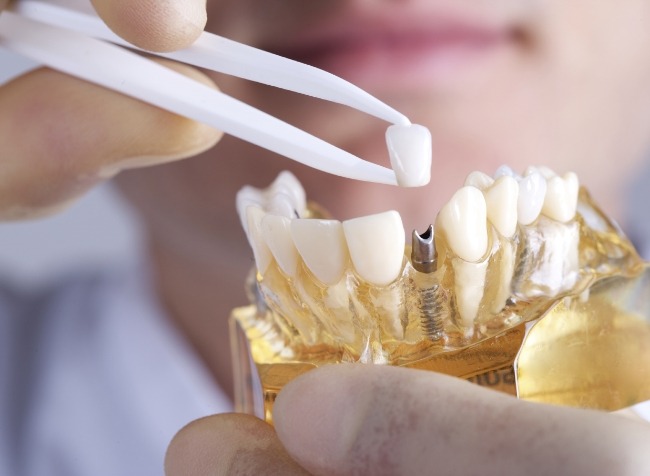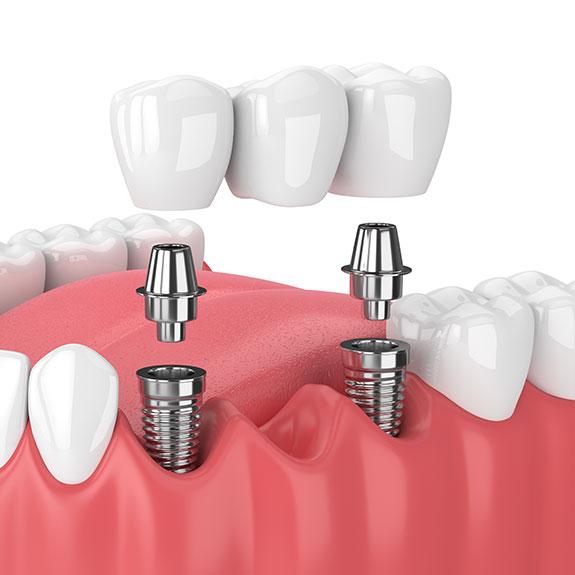Dental Implants
Replacement Teeth with a Lifelike Look & Feel

Missing teeth can have a big impact on your life by making basic daily tasks like eating and speaking more difficult and leading to other oral health issues if they aren’t replaced, like misalignment. Some patients are looking for a more stable, sturdy, and unwavering tooth replacement solution than traditional dentures or bridges, and that’s where dental implants come in. Dental implants are one of the most popular tooth replacement solutions because they offer a wide range of priceless benefits that distinguish them from their traditional counterparts. Schedule a consultation today to learn whether you’re a good dental implant candidate!
Why Choose Perez Family Dentistry for Dental Implants?
- Start-to-Finish Dental Implant Treatment In-House
- Family-Friendly, Comprehensive Dentistry
- Locally & Family-Owned, Personal Feel
What Are Dental Implants?

Dental implants are small titanium posts that are placed below the gumline and into the jawbone to restore the root structure of missing teeth. Due to their biocompatibility, they’re able to naturally fuse with the bone through a process called osseointegration over the course of three to six months after placement. Once this has occurred, prosthetics can safely be attached to the implants to restore missing teeth.
The 4-Step Dental Implant Process

Getting dental implants involves multiple steps spread out over a matter of months. This is balanced out by the fact that dental implants can generally be expected to last for decades and offer all kinds of advantages that you wouldn’t get from traditional bridges and dentures. You should have an idea of what getting dental implants entails before you take the first step, so here’s a brief summary of the process.
Initial Dental Implant Consultation

Some people are excellent candidates for dental implants. Others might need to have bone grafting and other forms of preliminary work performed before they can consider dental implants as a viable option. At your initial dental implant consultation, we can take a look at your mouth and your overall facial structure in order to answer the question of whether the dental implant process is truly worth pursuing in your case.
If it turns out that dental implants are a good fit for you, we can start putting together the treatment plan. Our team can give you an estimate of the timeline as well as the overall cost.
Dental Implant Surgery

Your mouth will be numbed for the surgery, so you won’t have to worry about discomfort. An appropriate number of implant posts will be inserted into your jaw. The location and angle of each post must be precisely determined beforehand in order to maximize the chances of a successful procedure. The gums will need to be opened for the surgery; once the procedure is complete, sutures will be used to close the tissue.
Dental Implant Osseointegration & Abutment

After your dental implants have been placed, it will be time for a natural process called osseointegration. This is where the implant posts join with the bone tissue around them, effectively allowing them to become part of your mouth. Osseointegration does not happen overnight; it normally takes three months or more.
After your implant posts have finished fusing with your jaw, you will return to our office for another procedure. This time, we will attach abutments to your implant posts. Abutments are small pieces of metal that serve a very simple function: making it possible to attach the final restoration.
Delivery of Dental Implant Restoration(s)

A dental implant restoration could be a crown, a bridge, or a denture. Needless to say, the extent of your tooth loss will be one of the biggest factors in determining which type of dental implant prosthesis is right for you.
The final restoration will be carefully personalized for your unique mouth, ensuring a dazzling appearance and a comfortable fit. The last step of the dental implant process is to attach your new teeth to the implant posts. Once they’re in place, the average person won’t be able to tell the difference between your natural teeth and your implant-supported prosthesis.
Benefits of Dental Implants

Dental implants offer a wide array of benefits that make them stand out from their traditional tooth replacement counterparts. Because they are surgically inserted into the jawbone, patients can look forward to benefits in their daily life, health, and long-term. Here are just some of the exciting advantages that dental implants have to offer.
Day-to-Day Benefits

Dental implants feel just like natural teeth, so you shouldn’t notice them much in your daily life. Here are some of the benefits that you can enjoy every day:
- Restored Bite Force: Your bite force can be restored to 80% or higher! This is much more than you can expect from dental bridges or dentures.
- Easy Maintenance: Caring for dental implants is just like caring for natural teeth. Brush twice, floss, and use mouthwash every day.
- Increased Confidence: You don’t need to worry about visible gaps in your smile or a poor fitting restoration.
Health Benefits

In addition to the noticeable benefits that you will experience daily, your health will also be positively influenced when you replace your missing teeth. Here are some of the benefits you will likely encounter:
- Improved Dental Health: Replacing your missing teeth with dental implants puts you at lower risk of gum disease, infection, and additional tooth loss. None of your natural teeth need to be altered for this restoration either.
- Better Overall Health: Having excellent dental health has a positive influence on your overall health. It even lowers your risk of serious medical problems, like diabetes and heart disease.
- Prevents Bone Loss: When you’re missing teeth, jawbone deterioration follows. Dental implants stimulate the jawbone just like natural tooth roots, keeping it strong and healthy!
Long-Term Benefits

When you choose dental implants, you are making an investment in the future of your smile. Here are some of the incredible benefits you can enjoy for many years going forward:
- Successful: Dental implants hold an astonishing success rate of over 95%. Your chances of experiencing a dental implant failure are meager.
- Permanent: Dental implants are intended to be a permanent solution to missing teeth. You can enjoy their benefits for several decades or even the rest of your life!
- Save Money: You don’t need to worry about stocking up on adhesives or soaking solutions. You also don’t need to pay for frequent repairs or replacements. Dental implants also reduce your risk of numerous oral health issues, meaning that you won’t need to endure costly treatments that will add up over time.
Who Dental Implants Can Help

Dental implants are versatile because they can address a wide range of tooth loss cases, from a single missing tooth to an entire arch of missing teeth. During your consultation, we’ll work closely with you to help you determine whether this treatment is right for you by examining your mouth and discussing your goals. Based on this, we’ll develop a customized treatment plan to restore your grin.
Missing One Tooth

For a single missing tooth, we can place one dental implant in the gap below the gumline to restore the root. Once it has fused with the jawbone, we can secure a customized, natural-looking dental crown to the implant to complete your arch.
Missing Multiple Teeth

Instead of needing to alter your natural tooth structure to anchor a dental bridge in place, we can secure the prosthetic to two dental implants placed on either edge of the space in your arch. This will restore anywhere from two to four teeth in a row.
Missing All of Your Teeth

If you’re looking for a sturdier and longer-lasting alternative to traditional dentures, we can secure between four and eight dental implants below the gumline. Once they’ve fused with the bone, we’ll be able to secure a customized denture to them to replace an entire row of missing teeth. Due to the added strength and unwavering stability of the implants, you won’t have to experience slipping or shifting dentures.
Understanding the Cost of Dental Implants

Each dental implant procedure we do is customized to fit every patient’s needs, which is why there’s no set price associated with the process. During your initial consultation, we’ll examine your mouth and assess several factors that contribute to the total cost, including how many implants will need to be placed, whether you’ll require preparatory procedures, and what type of restoration you’ll need. Based on this information, we can provide you with a more accurate and detailed estimate of the cost of dental implants.
Preliminary Treatments & Dental Implant Surgery

Some patients aren’t immediately eligible for dental implants; for example, their jaws might lack sufficient density to support the implant posts, or their gums might be compromised due to untreated gum disease. Fortunately, these issues can be addressed with certain preliminary procedures, including dental bone grafts and periodontal therapy. That said, even though they’re necessary for the success of your dental implants, these additional procedures also come with their own costs. Implant surgery itself also has a price of its own, and it’s normally affected by the location of the surgical site as well as which type of sedation is needed.
The Parts of Your Dental Implant

Dental implants have different parts associated with them, and these also contribute to the total cost of the procedure. Here’s what is usually considered:
- Number of Implants – It usually takes one implant to replace one tooth, two to replace a row of teeth, and 4 or more to replace an arch. Needless to say, more implants being placed means a higher cost.
- Type of Restoration – Crowns, bridges, and dentures all have varying costs, with smaller restorations tending to cost less.
- Material Used – Implants can be made of various biocompatible materials, with titanium and zirconia being the two most common choices. These have different costs.
- Brand – There are different implant manufacturers that meet the needs of various patients; the manufacturer we choose will affect the amount you end up paying.
How Dental Implants Pay for Themselves

When you’re considering how to restore your missing teeth, it can be tempting to try and save money by choosing traditional options like dentures or bridges over dental implants, but the truth is, implants can end up paying for themselves many times over. They don’t need to be replaced every 5 to 10 years, nor do they require specialized maintenance or cleaning methods. And since they’re also easier to take care of, they can help you avoid tooth decay, gum disease, and other costly oral health issues. In the long run, you’ll save quite a bit of money on your smile if you take great care of your implants, meaning their higher upfront cost is incredibly great value!
Does My Dental Insurance Cover Dental Implants?

Generally, most insurance plans don’t pay for the actual dental implants, though there are some exceptions. Sometimes, coverage applies to only portions of the treatment, like preliminary procedures and the actual restoration itself. In any case, it’s always wise to carefully review the specifics of your insurance policy before committing to any sort of care, including dental implants. If you have questions about your plan, our team would be more than happy to review it with you to ensure you’re saving wherever you can.
Making Dental Implants Affordable

In addition to accepting dental insurance, we are proud to partner with CareCredit. This third-party financier works with patients to spread out their payments over several months, allowing them to afford dental implants and other sorts of treatments without straining their budget. As always, just contact our team if you have questions about how to make your dental implant procedure more affordable; we are always happy to help!
Dental Implant Post-Op Instructions

Once you’ve had your dental implant placement surgery, there is a recovery period. We will give you detailed post-op instructions to abide by so you can heal quickly and comfortably. If you have any questions or concerns, don’t hesitate to contact us. Everyone’s treatment looks a little bit different, but here is what you can generally expect after surgery.
Man sleeping in bed

The number one priority during the healing process is to leave the blood clot at the surgical site alone. This is necessary for the process to go as smoothly as possible. Here are some of the rules that you will need to follow to achieve this:
- Don’t spit. Use a tissue or swallow your saliva.
- Don’t use a straw when drinking liquids.
- Don’t smoke immediately after surgery.
- Keep your tongue and fingers away from the surgical site.
Common Side Effects When Recovering from Dental Implant Placement

You will likely experience some minor side effects for a few days after your procedure. Here are the most common ones:
- Bleeding: Minor bleeding is common for a few days after surgery. To reduce bleeding, use gauze and light pressure.
- Swelling: For the first 72 hours after your procedure, inflammation is likely. Use a cold compress to reduce this.
- Discomfort: Soreness is normal after dental implant surgery. This can be managed with over-the-counter and prescribed pain relievers.
Your Diet After Dental Implant Surgery

Following surgery. It is ideal to stick to soft foods to avoid aggravating the surgical site. Here are some food suggestions:
- Scrambled eggs
- Oatmeal
- Soup
- Mashed potatoes
- Yogurt
- Apple sauce
- Pasta
- Pudding
- Ice cream
Post-Op Health & Oral Hygiene

The day after your surgery, you can brush your teeth like you normally do. However, it’s important that you are extremely careful to avoid the dental implant site. To keep this area clean, gently rinse your mouth with salt water two to three times a day after your meals. When you use mouthwash, make sure that you pick one that doesn’t contain alcohol. This can aggravate the surgical site.
What to Do After Your New Teeth Are Attached?

Now that your replacement teeth have been attached to your implants, the difficult part is over! You may notice some minor sensitivity as your mouth adjusts, but this should be mild and temporary. You shouldn’t experience any further swelling, bleeding, or extensive recovery.
Maintaining & Caring for Your Dental Implants

Like many other patients, you might be interested in dental implants because they can last for over three decades. If that’s the case, then keep reading – it’s important to know how to maintain and care for them properly! If you have any questions, don’t hesitate to let us know. We’d be happy to provide you with the answers you’re looking for.
Make Oral Hygiene a Priority

There’s a rumor that if you don’t have any of your natural teeth left, you don’t have to worry about good oral hygiene habits, like brushing consistently. That’s not the case. Not only does a solid dental care regimen keep your breath minty-fresh, but it also reduces your risk of peri-implantitis, which is a leading cause of dental implant failure. So, if you want your new and improved smile to last, make oral hygiene a priority!
Eat a Healthy Diet

Another important component of keeping your smile healthy and your dental implants in tip-top shape is eating a healthy diet. This is important because over-indulging on sugary and starchy foods can negatively impact the condition of your teeth and gums. Plus, hard pretzels, peanut brittle, and other crunchy foods can lead to a serious chip or crack in your restoration. For all of those reasons, it’s best to create meals that check three boxes: smile-friendly, healthy, and delicious.
Break Bad Habits

Smoking is often the first thing that comes to people’s minds when they think of bad dental habits. The truth is that’s just one of many ways you can accidentally wreak havoc on your smile. Biting your nails, chewing on ice cubes, and using your teeth to remove plastic wrapping can lead to serious consequences, including dental implant failure. So, don’t take the chance! Break any bad habits you have now; it will protect the time and money you invested in the smile-rebuilding process.
Protect Your Dental Implants

Do you like to start your mornings with a run? Maybe you like to ride your bike after work or play a pick-up game of soccer with your friends when the weather is nice. No matter what the case is, you need a mouthguard. That way, your teeth, the soft tissue in your mouth, and your dental implants are protected from harm.
Bonus tip: Schedule an appointment with our Marco Island dentist if you clench/grind your teeth at night. Dr. Perez can have a custom nightguard made for you!
Schedule Regular Dental Checkups

Whether you only have one dental implant or you don’t have any of your natural teeth left, you need to come to our Marco Island dental office every six months for a checkup and cleaning. If you start to experience abnormal symptoms, like pain when biting down or persistent sensitivity, then contact us to schedule an appointment – even if your biannual visit is a few months away. The sooner you come in, the sooner we can determine the root of the problem and the best way to treat it.
Dental Implant FAQs
How Long Have Dental Implants Been Around?
The oldest evidence of dental implants dates back to about 600 A.D., if you can believe it. Of course, the ones used today look drastically different thanks to decades of advancements in both dentistry and technology. It just goes to show that tooth loss is something that humans have sought to address for ages!
How Long Do Dental Implants Last?
Dental implants are known for lasting 30+ years. However, the longevity of yours depends largely on how well you care for your smile. In other words, they won’t last if you get in the habit of smoking, not flossing, or skipping your biannual visits to our office. That’s why we strongly recommend committing to good ones instead, like brushing consistently and maintaining a well-balanced diet that’s low in added sugar.
How Can I Tell If My Dental Implant Is Failing?
The best thing to do is keep an eye out for abnormal symptoms. Pain stemming from the implant site or a loose dental implant are examples of warning signs that something is wrong. So, don’t wait – contact our team to let us know what’s going on. From there, we can schedule an appointment (the same day, if needed) and pinpoint the root of the problem.
Am I Too Young to Get Dental Implants?
Most of the time, patients aren’t candidates for dental implants until their mid-20s. That’s because the jaw often isn’t completely developed until then! The good news is that we can provide dental bridges for children and young adults who aren’t quite candidates yet. That way, they don’t miss out on a healthy, beautiful, and complete smile in the meantime.
Will I Have to Take Off Work for Dental Implant Surgery?
Most patients need to dedicate at least a day or two to recovery, which is why the dental implant procedure is often scheduled on Thursdays and Fridays. If your job is physically demanding, then we may recommend taking more time off. It really depends on your unique case.
Can I Get Dental Implants If I Smoke?
Smoking won’t immediately disqualify you, but it is something that we need to seriously consider. After all, tobacco products lead to problems like dry sockets and delayed healing. Plus, they increase the likelihood of dental implant failure! At the absolute minimum, you’ll need to refrain from smoking for two weeks prior and three months afterward.
Note: We know that quitting smoking is by no means an easy task. That’s why we’re here to provide support, share recommendations, and answer any questions you have!
Do Dental Implants Decay?
Dental implants cannot decay because they aren’t made of enamel. Of course, any natural teeth that are remaining can still decay, and your gums can still develop an infection. That’s why it’s so important to implement a solid oral hygiene regimen whether you’re missing one tooth or all of them!
